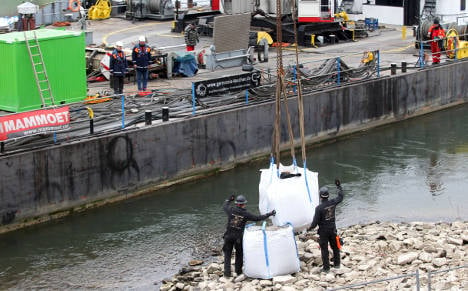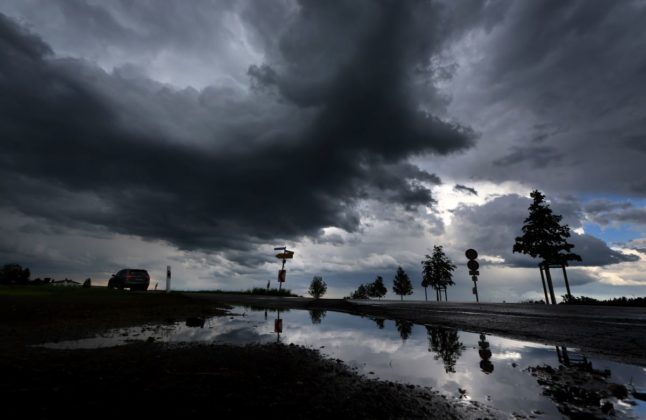“Then people hid in their cellars. People were told to leave the city, but there was no organised evacuation, nothing like this,” Manfred Morschhäuser, of the city fire department told The Local.
“This is the biggest evacuation in Germany since the end of the war,” he said of efforts to move around 45,000 people from a 1.8 kilometre radius around the 1.8-tonne bomb discovered near the bank of the Rhine River.
Sandbanks are being erected around the site where the massive bomb, as well as a smaller one and a WWII smoke bomb were found thanks to the receding waters of the Rhine during this dry autumn. It was one of many dropped by the British Royal Air Force over the city towards the end of the war in raids which destroyed 80 percent of the city, Morschhäuser said.
The bomb, which is currently 40 centimetres under water, will be surrounded by a levee to create a dry space around it, enabling the disposal team to work on it on Sunday.
The city has already started getting its people to safety. That includes around 700 people in two hospitals – including some very ill people in intensive care.
“This has already started, as it takes a lot of time, but it should be completed on time – most people will be on their way to other hospitals on Friday,” Morschhäuser said. “The old people’s homes, where we have around 520 people to move, will be evacuated on Sunday itself – we will have around 300 vehicles including ambulances to move them.”
Around 200 prisoners will also have to be moved from the jail, which houses people accused and convicted of crimes from theft to murder, spokeswoman Andrea Kästner told The Local.
“We mostly house people in investigative custody, so they have not been convicted, but they are accused of a very broad range of crimes, from theft to murder. Of course some of them could be considered dangerous,” she said. “We are gathering information from other prisons in the state about how many spaces they have. It will be a huge operation. We have people working here who have been here since the 1970s and there has certainly not been anything like this in that time.”
She said normal prison buses would be used to take the prisoners to other jails where they would spend the night, but then be returned on Monday. When asked if there were concerns some prisoners could take advantage of the situation to try to escape, she said, “We certainly hope not.”
Buses will also be laid on for the public who need to leave their homes for the day. They have been told to be gone by 9am.
“People are very relaxed about it, even though it’s nearly half the city’s population who will have to move,” said Morschhäuser. “Many have left their houses before in smaller evacuations for other bombs. We have found 29 bombs here in the last 12 years.”
This is the biggest yet though, and as well as all fire fighters and other emergency service personnel being put on duty on Sunday, volunteers from the Technisches Hilfswerk – the German emergency relief agency – will be on hand, prepared to shut off gas supply pipes should anything go wrong.
The Local/hc



 Please whitelist us to continue reading.
Please whitelist us to continue reading.
Member comments